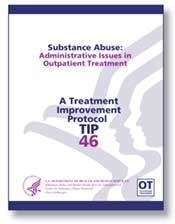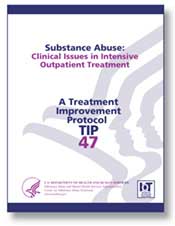Addressing Issues in Outpatient Treatment
By Leslie Quander Wooldridge
SAMHSA's Center for Substance Abuse Treatment (CSAT) recently released two Treatment Improvement Protocols (TIPs) for clinicians and administrators who work in outpatient treatment programs.
Developed as a result of discussions among members of CSAT's Knowledge Application Program (KAP) expert panel, TIP 46 is titled Substance Abuse: Administrative Issues in Outpatient Treatment. The companion text, TIP 47, is titled Substance Abuse: Clinical Issues in Intensive Outpatient Treatment.
These TIPs update the subject matter of CSAT's TIP 8, Intensive Outpatient Treatment for Alcohol and Other Drug Abuse, published in 1994. Since the original TIP was published, substantial changes have occurred in almost every aspect of the way treatment services are conceptualized and delivered.
Outpatient programs are now widely used for clients of all ages with a moderate range of problems. In addition, these programs serve adolescents, clients who are homeless, and persons with co-occurring mental disorders.
As outpatient programs serve a broader client population than ever before, program administrators face an array of challenges, including high turnover in the administrative and clinical ranks. And, as intensive outpatient treatment (IOT) programs have expanded in popularity, clinicians have had to keep abreast of new treatment approaches and services provided beyond their own programs.
Back to Top
For Administrators
 Most of the concepts and guidelines in TIP 46 apply to the administration of outpatient treatment programs for substance abuse, including those considered "intensive" settings. This publication focuses on strategies for program survival and growth and provides basic information about running an outpatient treatment program. Most of the concepts and guidelines in TIP 46 apply to the administration of outpatient treatment programs for substance abuse, including those considered "intensive" settings. This publication focuses on strategies for program survival and growth and provides basic information about running an outpatient treatment program.
Management Issues. Guidelines for developing structural elements of a successful program include strategic planning and partnerships, bylaws, and program policy. Also addressed in TIP 46 are day-to-day management issues of a treatment program, including policies and procedures, staffing, and budgets.
Cultural Diversity. A challenge to outpatient treatment programs is expanding cultural diversity. Currently, the majority of treatment providers are white; however, nearly half of clients are from various ethnic groups. TIP 46 discusses this issue in detail and explains how to conduct community, client, and program assessments of cultural competence. The TIP also provides recommendations and an annotated list of resources to assist programs in cultural competence education, assessment, and training.
Back to Top
For Clinicians
 TIP 47 is intended to be useful to all IOT programs, including day treatment and partial hospitalization programs. Focusing on clinicians working in outpatient programs, TIP 47 explores the treatment options available as well as the most important skills required to work in the field. TIP 47 is intended to be useful to all IOT programs, including day treatment and partial hospitalization programs. Focusing on clinicians working in outpatient programs, TIP 47 explores the treatment options available as well as the most important skills required to work in the field.
Principles of Treatment. TIP 47 synthesizes information from the convergence of research and practice during recent years, and presents 14 guiding principles for IOT. Principles include assessing and addressing individual treatment needs, monitoring abstinence, and providing ongoing care.
Program Services. TIP 47 describes the core services that IOT programs should provide and the enhanced services that often are delivered onsite or through established links with community-based providers. The core services include group counseling and therapy in addition to monitoring substance use. Enhanced services include adult education and parenting classes.
To order free copies of TIP 46, Substance Abuse: Administrative Issues in Outpatient Treatment, or TIP 47, Substance Abuse: Clinical Issues in Intensive Outpatient Treatment, contact SAMHSA's National Clearinghouse for Alcohol and Drug Information at 1 (800) 729-6686 (English and Spanish) or 1 (800) 487-4889 (TDD). Request NCADI number BKD545 for TIP 46 or NCADI number BKD551 for TIP 47. Online, TIP 46 is currently available at www.kap.samhsa.gov/
products/manuals/tips/numerical.htm. TIP 47 will be available online and in print soon. 
« Previous Article
See Also—Next Article »
Back to Top |

